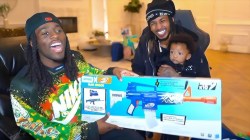There is enough packed inside 2014 Forest Hills Drive to make your palms sweat, urging for J. Cole to push through the finish line with a flourish. Cole has come home. The concept and a deft one — is the prodigal son returning. Making his way back to what’s important, to what’s at his core. He channels a few different emcees to do this. Kendricks’ multi-verse on “03’ Adolescence,” “Wet Dreamz,” and “G.O.M.D.” As well as his own flame pit of bravado and melancholy on a “Tale Of Two Citiez,” “Fire Squad,” “No Role Modelz,” and “Hello,” and there’s Drake sprinkled generously throughout the narrative as J. Cole elects to sing quite a few of his own hooks and quite a bit in general. The result is an album that wobbles violently between narratives, the different trade winds he’s dealing in colliding with each other in sometimes-unforeseen ways.
Cole channels young Simba early in the record (after the preamble that is “January 28th”), but the preamble is one of the most interesting songs on the album because he tips his hand with the hook, “Don’t give ‘em too much you / Don’t let ‘em take control / Its one thing you do / Don’t let ‘em taint your soul / If you believe in God / One thing’s for sure / If you don’t aim too high / Then you aim too low.” It’s his next line, though, that requires a bit of investigation: “What’s the price for a black man’s life? / I check the toe tag, not one zero in sight / I turn the TV on, not one hero in sight / Unless he dribble or he fiddle with mics.” It’s this disconnect from his own stature that’s jarring and important to the arc of the album. Simba hasn’t yet realized who he is. This lack of knowledge of self is part of the albums overall amble forward as the rest shows you the journey that leads to his return. It’s an interesting choice, as Cole moves away from neat closure — at least early on.
After the controversial “Fire Squad,” Cole time-skips with “St. Tropez,” hitching a ride on samples of Chaka Khan’s “Hollywood” and Esther Phillips “That’s All Right With Me.” Queuing up a theme of black man lost, Cole transforms into “Hollywood” Cole. “G.O.M.D” reveals this second Cole to be strangling the original. The guy who postured to get his High School crush into bed is now diving through meaningless relationships left and right. The noise machine that is Cole’s voice works here, as it reveals the drowning, vulnerable Cole in juxtaposition to the assured, confident imposter. He’s also making fun of Rap as a whole here, and as usual, pointing out how the money, women, and clothes aesthetic steals from his perception of authenticity. It very much feels like MGMT’s “Time To Pretend.” He could have easily had them on the hook sleep singing “This is our decision / To live fast and die young / We’ve got the vision, now let’s have some fun / Yeah, it’s overwhelming, but what else can we do? / Get jobs in offices and wake up for the morning commute?” But he chooses to do everything himself, and this choice defines the album for good or ill.

AD LOADING...
The album get’s angular after this, running through very familiar tropes with varying degrees of success. Dealing with a lovely but shallow woman on “No Role Modelz,” as he awkwardly slings the fact that he wants a, “Real love / A Jada and Will love.” “Hello” then sees him baring the fangs of real emotion as he pushes existential heartache, navigating the idea that what you want isn’t necessarily what you need. His demons make an appearance, as well, talking himself out of love because he’d have to be the stepfather to her two children. The extremely relatable “Apparently” follows, and is the beginning of the end for “Hollywood” Cole, as he comes back to himself and struggles on back to 2014 Forest Hills Drive. Then the kicker, “Love Yourz,” where he ties it all together with the hook, “There’s no such thing as a life that’s better than yours.” Providing all together too neat of an ending, which he did not hint at earlier.
There are many things that can be said bout J. Coles’ 2014 Forest Hills Drive. It is ambitious and hokey and simplistic. It tries its hand at twists and comes up short (“Wet Dreamz”), and it sticks to Cole’s strategy instead of changing it drastically. It is less artistic than it means to be, but it is truer than anything he’s ever made. Its narrative, the tropes, and the strategies are completely overcome by the albums terrifying integrity. It is immensely relatable because it is not afraid to be corny and cliche´. It does not shirk the average experience; it embraces it and, somehow, makes you feel like we’re all in this together. And in this age of false irony, and the squashing of experience down into preconceived individual events where we all believe ourselves to be so different and so special, it’s fascinating to see an artist delve so fearlessly into the completely familiar.



